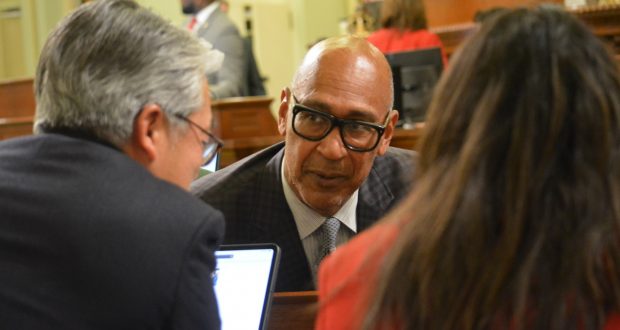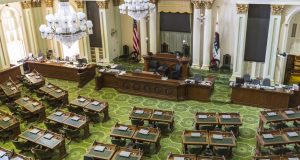By Antonio Ray Harvey | California Black Media
After months of heated political fights, and just before the Sept.14 deadline for passing bills introduced during the 2023 legislative session, the California Assembly passed Assembly Bill (AB) 1228, the “Fast Food Franchisor Responsibility Act.”
Just before midnight, the Senate did the same with a 32-8 vote.
Should Gov. Gavin Newsom sign the bill, an estimated 550,000 fast food workers in California would earn a minimum wage of $20 per hour.
Assemblymember Chris Holden (D-Pasadena), who authored the bill – and who later became a key dealmaker in negotiations critical to the passage of the legislation — expressed his satisfaction that opponents and proponents were able to reach a compromise that is mutually beneficial.
“I think it was important that we were able to get a resolution to the conflict between the coalition of businesses with franchisees and franchisors,” said Holden, a member of the California Black Legislative Caucus (CLBC). “But also making sure that we accomplish a goal of setting a council to the ongoing ways of looking at the workplace and making sure that the workers had a safe place to go to work.”
Holden said the bill will improve protections and foster a healthy work environment in California’s fast-food industry.
AB 1228 enforces a joint-employer liability theory between a fast-food restaurant’s franchisor and franchisee, by requiring the franchisor to share “all civil legal responsibility and civil liability for the fast-food restaurant franchisee’s violations.”
To secure its passage, Holden, Gov. Gavin Newsom’s office, and labor unions brokered a compromise to stave off a referendum scheduled for the November 2024 General Election that aimed to repeal A.B. 257, also known as the Fast-Food Accountability and Standards Recovery Act.
“I thought it was a good outcome for all parties,” Holden told California Black Media of the negotiations. “They were sitting at the table with us as we were presenting the bill (Sept. 12).”
AB 257, which was signed into law in September 2022 facilitated the creation of a “Fast Food Council” composed of employees, advocates, franchisors, franchisees, and government officials tasked with overseeing wages and working conditions in fast-food facilities.
In May, a group known as The Stop the Attack on Local Restaurants coalition, which includes social justice advocates, local restaurant owners, small businesses, ethnic business leaders, restaurant brands and trade associations, expressed their concern that AB 1228 would cut off inroads to business ownership for minority entrepreneurs.
On Sept. 11, the Save Local Restaurants coalition announced that a “comprehensive legislative agreement had been reached regarding quick service restaurants” and legislative and regulatory issues in California.
“(The agreement) provides meaningful wage increases for workers, while at the same time eliminates more significant – and potentially existential – threats, costs, and regulatory burdens targeting local restaurants in California,” said Matt Haller, President and CEO, International Franchise Association.
All 12 members of the California Legislative Black Caucus (CLBC), including Holden, voted for A.B. 1228. The members were CLBC chair Lori Wilson (D-Suisun City), vice-chair Steven Bradford (D-Inglewood), Sen. Lola Smallwood-Cuevas (D-Ladera Heights) and Assemblymembers Mia Bonta (D-Alameda), Mike Gipson (D-Carson), Corey Jackson (D-Riverside), Reggie Jones-Sawyer (D-Los Angeles), Kevin McCarty (D-Sacramento), Tina McKinnor (D-Inglewood) and Akilah Weber (D-La Mesa).
Assemblymember James Gallagher (R-Yuba City), Minority Leader of the California Assembly, said complicated bills such as AB 1228 should not wait “until the 11th hour” to be voted on.
“If it’s anything after 8 p.m. it usually not good,” said Gallagher, who voted against Holden’s bill.
 Westside Story Newspaper – Online The News of The Empire – Sharing the Quest for Excellence
Westside Story Newspaper – Online The News of The Empire – Sharing the Quest for Excellence





